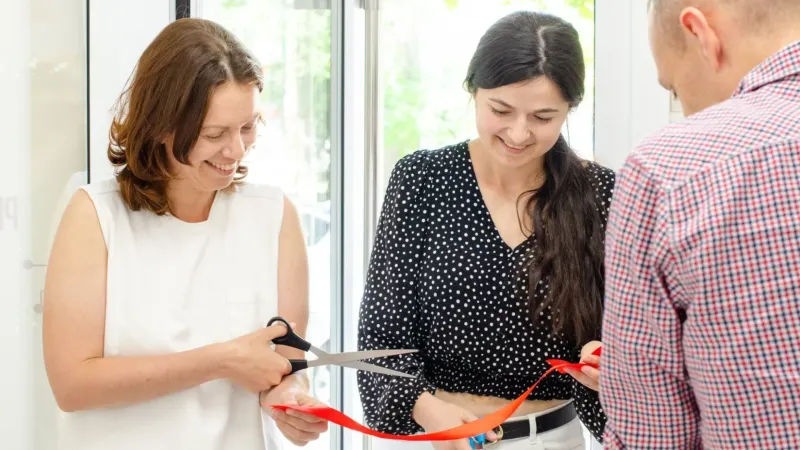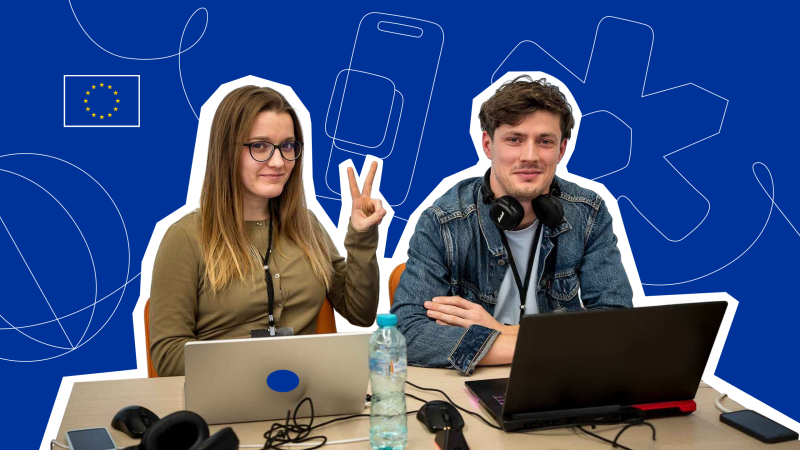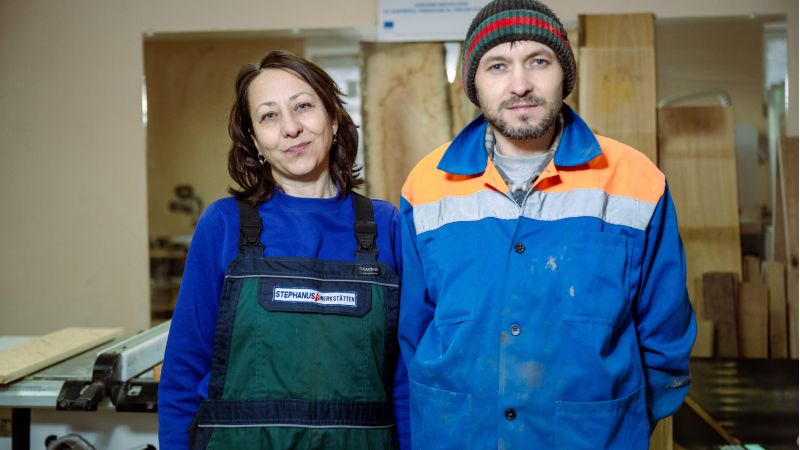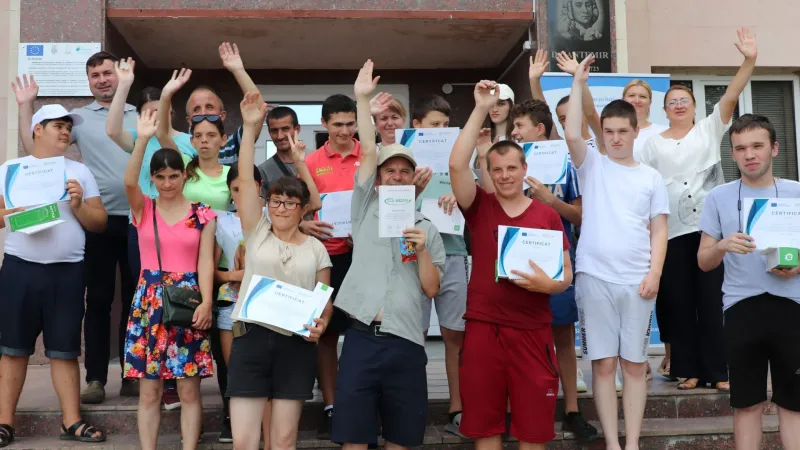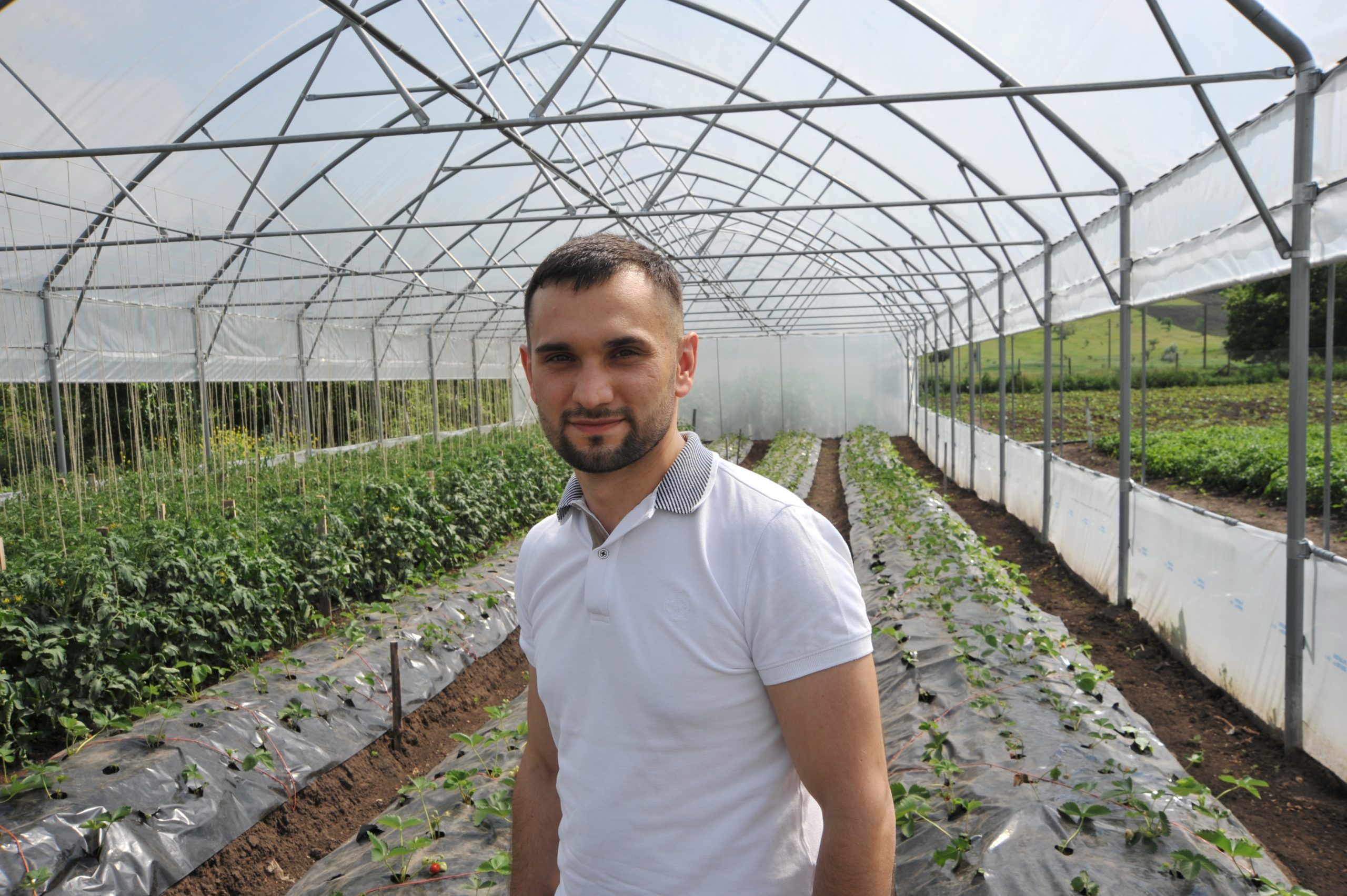
Agricultură pe ecranul smartphone-ului. O mică întreprindere agricolă din Moldova cucerește tehnologiile digitale
- Domenii transversale
- Societatea Civilă
- Dezvoltare economică & oportunități de piață
- Economie și comerț
- Ocuparea forței de muncă și antreprenoriatul
- Agricultura și dezvoltarea rurală
- Mobilitate & contacte interpersonale
- Educație și formare profesională
- Cercetare & inovații
În drum spre un serviciu obișnuit la Chișinău, vezi într-o aplicație mobilă, cum sunt prelucrate câmpurile tale din raionul Hâncești, care este umiditatea solului de acolo și ce ar trebui să mai facă angajații în această zi.
Ion Tașcă a obținut studii superioare în România, însă după absolvirea universității, a revenit acasă pentru a crea „ceva frumos” aici: împreună cu tatăl său, a început să se ocupe de agricultură „cu viziune în viitor”. NM prezintă, cum tehnologiile digitale transformă o ramură tradițională a economiei și cum agricultorii cuceresc treptat digitalul.
Satul Ciuciuleni din raionul Hâncești se află la doar 55 km de Chișinău. La prima vedere, nu se prea face remarcat prin ceva. Conform statisticii, aici locuiesc puțin peste patru mii de persoane. Încă acum cinci ani, în tot satul erau doar vreo 300 de calculatoare. Însă astăzi, anume aici „se reconstruiește” treptat gospodăria lui Ion Tașcă și a familiei sale, care este administrată aproape în totalitate printr-o aplicație mobilă.
Tradițiile și viitorul
Ion știa încă din copilărie ce înseamnă agricultură. El își petrecea fiecare vară la Ciuciuleni, satul de baștină al părinților săi.
„Bunelul a fost combiner, a lucrat cu tractorul. Am văzut încă în copilărie toată această tehnică agricolă, mă jucam cu ea. Îmi era foarte interesant”, își amintește Ion.
Când s-a maturizat deja, a plecat în România să studieze medicina veterinară. Dar, spre deosebire de mulți alți concetățeni, a reușit să revină acasă după ce și-a primit diploma. „Împreună cu soția – pe atunci, logodnica – am decis să creăm ceva frumos acasă. Aici erau părinții, prietenii, rudele. Și nu voiam să plecăm”, povestește Ion.
În anul 2016, el a revenit în Moldova, iar doi ani mai târziu, împreună cu tatăl său, și-a deschis prima afacere. Adunând toate economiile, au înregistrat compania „Agro-Vet Consulting”, au achiziționat primul tractor, câteva hectare de pământ în satul natal Ciuciuleni. Au semănat grâu și au plantat viță de vie. Dar au decis imediat: cum era cândva – nu se poate. Continuând să lucreze în calitate de veterinar la o fermă din apropierea Chișinăului, Ion a început să-și dezvolte și să „digitalizeze” afacerea de familie.
„Noi am înțeles imediat că dacă facem totul în mod tradițional, înseamnă că trebuie să fim acolo mereu, 100%. Însă acest lucru nu are viitor. Și văd că și în specialitatea mea de bază trebuie să folosim ceva nou: este benefic”, povestește Ion. Și adaugă imediat: „Secolul trecut rămâne departe, în urmă”.
Ion a simțit imediat necesitatea unor asistenți electronici. El își amintește că tatăl său a trăit încă din copilărie în acest sat și cunoștea foarte bine toate câmpurile. Iar lui, după o absență îndelungată, îi era mai dificil să se orienteze. Era complicat să se clarifice și să țină minte, ce și unde se află, ce și unde crește. Cu aceasta a început digitalizarea: compania a achiziționat o hartă electronică proprie cu imagini prin satelit în sistemul electronic Cropio.
„Acum, eu pot să văd și de la calculator, și din telefonul mobil toate câmpurile, de la înălțime. Să-mi imaginez, cum pot fi consolidate terenurile separate, ce și unde să cultiv”, spune Ion, demonstrând terenurile sale pe ecranul telefonului mobil.
Acum, agricultorul poate vedea în acest program toate echipamentele care îi aparțin, unde se află acestea, ce traseu au parcurs și cât combustibil au consumat deja.
„Seara, putem să facem simularea zilei, cum a circulat toată tehnica. La început, pentru „tânărul din mine”, toate acestea arătau ca un joc captivant, ca o strategie. Dar toate acestea chiar funcționează”, susține Ion. El menționează că acest program este foarte comod pentru gospodăriile mici, precum cea care îi aparține, iar pe niște plantații mari, un astfel de ajutor este pur și simplu indispensabil.
De la o pasiune până la o afacere
Ion spune că nu este vorba despre o „supraveghere” sau un control al angajaților. Astfel de aplicații contribuie la o mai bună organizare a muncii și la creșterea productivității întreprinderii.
„Totul poate fi monitorizat la distanță, procesul poate fi optimizat. Pentru că întotdeauna trebuie să ții mâna pe puls – ce se întâmplă, care este situația carburanților, dacă nu cumva s-a deteriorat ceva. Acest lucru permite să se calculeze costurile, să fie elaborat planul lucrărilor, să fie distribuite îngrășămintele”, povestește fermierul.
La început, nu a fost chiar atât de simplu să fie introduse sistemele electronice. Ion spune că inițial, angajații erau neîncrezători față de acestea. A trebuit să li se explice că toate acestea nu sunt doar pentru a-i „monitoriza”, dar pentru și a înțelege situația în ansamblu.
„În afaceri, trebuie să înțelegi clar, ce bani investești și cât obții. Altfel, aceasta nu este o afacere, ci o pasiune. Trebuie să înțelegi, cât timp și cât de repede se prelucrează un hectar, cât combustibil se consumă. Doar atunci poți vedea dacă există rentabilitate sau nu”, explică Ion. Acum, angajații s-au obișnuit deja și ei înșiși îl sună pentru a preciza, cât au prelucrat și cum ar fi mai bine să fie planificat traseul.
Treptat, ceea ce pentru Ion și familia sa a început ca o pasiune de care se ocupau în zilele de odihnă s-a transformat într-o adevărată afacere. În prezent, compania lor deține peste 100 ha de terenuri în diferite regiuni ale satului Ciuciuleni. Pe acestea se cultivă grâu, porumb, ovăz, floarea soarelui, struguri, care sunt comercializate companiilor de procesare direct de pe câmp. În aplicația mobilă, la fel ca și într-un joc la calculator, se văd deja trei tractoare și o combină.
Ion continuă să lucreze în calitate de veterinar la Chișinău și doar o dată la două-trei zile pleacă pe puțin timp la Ciuciuleni. Afacerea este în continuare una de familie: și tatăl fermierului se implică în toate inovațiile pe care le aplică fiul său.
„Să vă spun: el nu doar că este bucuros, ci chiar își dorește din ce în ce mai mult. Înțelege că fără noile tehnologii, noi nu putem merge mai departe”, afirmă Ion.
Monitorizare la distanță
Orientat spre „economia digitală”, Ion a început aproape imediat să participe la diferite proiecte de instruire pentru afaceri. Astfel, el a ajuns și în proiectul Digital Upgrade, care s-a realizat în baza Tekwill cu susținerea USAID, a Suediei și a Organizației pentru Dezvoltarea Sectorului IMM (ODIMM).
Dacă majoritatea antreprenorilor veneau la cursuri pentru a înțelege cum să-și vândă produsele în regim online, Ion a decis, datorită tehnologiilor digitale, să îmbunătățească productivitatea companiei și să obțină o monitorizare la distanță mult mai exactă.
Maria Nemciuc, specialist în asistență antreprenorială în cadrul Startup Moldova, a comunicat că din cauza pandemiei, mai multe organizații partenere au fost nevoite să-și ajusteze rapid planurile: digitalizarea s-a realizat într-un ritm accelerat. În același timp, seminarele instructive și granturile în cadrul Digital Upgrade erau acordate în strictă conformitate cu cererile antreprenorilor. Consultanții au oferit sprijin în identificarea necesităților actuale ale afacerilor.
Ion mai spune că în diferite regiuni ale Moldovei, sunt instalate câteva stații meteorologice. Prognozele acestora sunt exacte doar într-o anumită rază. Nu demult, împreună cu tatăl său, el a instalat pe teritoriul câmpurilor sale propria stație meteorologică. Aceasta este mică și colectează informații inclusiv din solul pe care îl prelucrează agricultorii.
Datorită Digital Upgrade, stația este conectată acum la Field Climate, o aplicație mobilă specială. „Putem monitoriza volumul precipitațiilor, viteza vântului, umiditatea. Toate acestea sunt foarte importante. De exemplu, când e vânt puternic, n-are sens să fie stropite terenurile – totul va fi suflat într-o parte. De umiditate depinde, ce culturi pot fi semănate anume acum”, precizează Ion.
Cu ajutorul aplicației, poate fi optimizată chiar și aplicarea îngrășămintelor și prevenită îmbolnăvirea plantelor. Astfel, aplicația prognozează ce boli ar putea fi în cazul unor anumiți factori climaterici: nivelul de umiditate, temperatura și vântul. Fermierii pot să stropească la timp culturile și să nu piardă recoltele.
„Toate acestea ne ajută să prognozăm, să utilizăm resursele în mod rațional, să prevenim pierderile. Numai așa putem atinge un nivel european al lucrărilor agricole. Cu părere de rău, în unele nișe din Moldova încă se face totul ca în secolul trecut”, spune Ion.
Cu ajutorul tehnologiilor moderne, se poate obține și o atitudine mai grijulie față de mediu. „Pământul nu suportă totul, trebuie să avem grijă de el. Când unele substanțe se folosesc mai des decât trebuie, este afectat mai întâi solul, apoi și sănătatea noastră”, precizează Ion. Aplicația permite o mai bună planificare a distribuției îngrășămintelor – pe care terenuri există probleme și e nevoie de mai multe îngrășăminte, dar pe care se poate trece și fără ele.
„Ne dorim să lucrăm nu numai pentru ziua de astăzi, dar și să lăsăm ceva frumos copiilor”, susține fermierul.
O nouă provocare a pandemiei
Digitalizarea afacerilor se produce treptat nu numai în Moldova. „Astăzi, digitalizarea este una dintre provocările principale cu care se confruntă businessul mic și mijlociu nu numai în Moldova, dar și în toată Europa”, menționează Māra Jākobsone, reprezentanta programului european EU4Digital. Acest program este o inițiativă a UE pentru dezvoltarea economiei și a societății digitale în țările Parteneriatului Estic.
Competențele digitale constituie una dintre cele șase priorități ale programului EU4Digital. Aceasta susține implementarea strategiilor de dezvoltare a digitalizării în Moldova: sprijină guvernul în evaluarea problemei în acest domeniu și în stabilirea strategiilor de dezvoltare a businessului mic. De asemenea, EU4Digital susține înființarea asociațiilor profesionale la nivel național în comun cu asociația ATIC din sectorul IT din Moldova. De notat că ATIC oferă asistență guvernului, afacerilor, ONG-urilor și instituțiilor de învățământ pentru ca împreună, să dezvolte competențe în domeniul digitalizării.
Jākobsone subliniază faptul că asimilarea tehnologiilor digitale ajută nu numai la identificarea noilor clienți, dar și la eficientizarea afacerilor de aproape orice tip.
De notat că potrivit Indicelui european al economiei și societății digitale pentru anul 2020, doar 12 la sută dintre întreprinderile mici și mijlocii din țările UE folosesc analiza digitală a datelor în activitatea lor. Doar 17% folosesc stocarea în cloud. Jākobsone consideră că strategia sistemică de susținere a businessului mic și mijlociu, elaborat la inițiativa proiectului EU4Digital, va permite întreprinderilor să completeze aceste lacune și să le conducă spre un nou nivel.
Iulia Costin, directorul general ODIMM Moldova, subliniază faptul că într-un an de pandemie și carantină, necesitatea dezvoltării în spațiul digital a devenit și mai evidentă. „S-a constatat că 75 la sută din companiile din businessul mic și mijlociu nu au nici site”, a spus Costin.
Potrivit afirmațiilor sale, programul Digital Upgrade a devenit „un colac de salvare” pentru mulți antreprenori. Datorită asistenței Uniunii Europene și parteneriatului cu Tekwill și Startup Moldova, zeci de companii au beneficiat de asistență.
Ce urmează
Ion recunoaște că anul pandemic n-a fost unul deloc simplu nici pentru agricultori: recolta de grâu și cea de porumb au fost practic pierdute. A fost nevoit să acceseze credite, iar o parte din investiții – să fie amânate.
„Dar orice afacere este riscantă, este ceva firesc. Desigur, e imposibil să separi politica de afaceri în proporție de 100%, pentru că totul este interdependent. Dar trebuie să depunem eforturi și, dacă există ambiții, planuri și un management bun, totul ar trebui să ne reușească”, este sigur Ion.
Nu-i exclus că în curând, compania sa va avea nevoie și de un site pentru vânzări directe. Pe teritoriul companiei a fost constuită deja prima seră, în care vor fi cultivate roșii, castraveți, căpșune, ardei dulci. Ion speră să ajungă cu aceste produse până la consumatorul final.
Imediat ce situația va permite, compania sa va achiziționa și o dronă mare: cu ajutorul acesteia, va fi posibilă irigarea terenurilor fără a implica tractoarele și fără prea mari cheltuieli pentru combustibil și resurse umane. Însă aceasta, în funcție de componente, ar putea costa de la 10 mii de euro până la 50 mii de euro. „Deocamdată, o dronă mare este un vis pentru noi, dar ne-am dori ca acesta să se îndeplinească”, concluzionează Ion.
Articole pe Newsmaker.md în Română și Rusă
Află mai multe
EU4 Digital https://eufordigital.eu/ro/
EU4Digital eCompetențe https://eufordigital.eu/ro/thematic-area/eskills/
Delegația UE în Republica Moldova https://eeas.europa.eu/delegations/moldova_ro
Tekwill https://tekwill.md
Tekwill oportunități educaționale https://tekwill.md/education/
Tekwill Programul educațional de digitalizare a IMM https://tekwill.md/news/digital-upgrade-has-started-the-educational-program-for-digitizing-smes-2/
În cadrul EU4Digital Initiative, Uniunea Europeană sprijină implementarea strategiilor de dezvoltare a competențelor digitale în țările Parteneriatului Estic prin:
- Elaborarea metodologiei de măsurare și evaluare a lacunelor în materie de competențe digitale la nivel național.
- Stabilirea unei strategii comune pentru businessul mic și mijlociu.
- Înființarea unei asociații naționale profesionale, pe lângă cele create deja în Armenia, Azerbaidjan și Ucraina; continuă activitățile în vederea creării unor asociații similare în Belarus, Georgia și Moldova.
- Organizarea seminarelor și workshop-urilor.
- Implementarea campaniilor de promovare în țările partenere.

